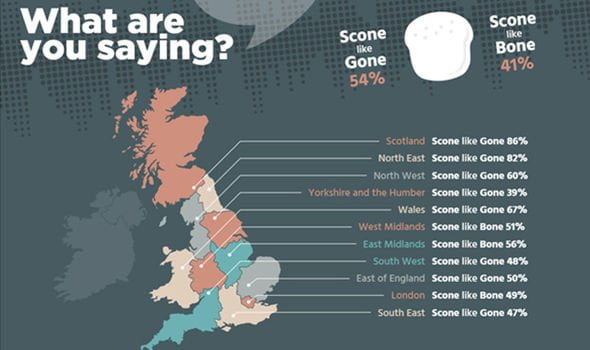https://www.thesun.co.uk/wp-content/uploads/2016/06/nintchdbpict000245405097.jpg?quality=100&w=960
[Accessed 26 March 2018]
How to Pronounce Scone: A Heated Debate
The dispute as to the pronunciation of this truly key word in the English language is well documented and very intense that it is hard initially to fathom out why the manner of description of an item on the English tea table is quite so important. Scone is one of the many anomalies of the English language: do you pronounce it to rhyme with ‘cone’ or ‘gone’? The answer to this seems to indicate a whole raft of class issues and complications as the social standing of the speaker is somehow clued over this most English of battlefields: the tea table.
Cambridge University: ‘The Great Scone Map’
https://www.express.co.uk/life-style/life/802697/how-do-you-say-scone
[Accessed: 26 March 2018]
In fact, linguists believe that the real key to an individual’s pronunciation of this word lies in the regional difference of language across the British Isles. Unbelievably, academics at Cambridge University have produced a document called, ‘The Great Scone Map’ although I am sure no-one dares to actually talk about it. This document shows that there is something of a north/south divide on the pronunciation of the word and that in the north of England and Scotland, scone is pronounced to rhyme with ‘gone’ and in the Midlands and interestingly Southern Ireland, the alternative pronunciation prevails. In the rest of the country, it reveals a fairly even split between the two words. There are, of course, always exceptions to the rule, which often makes it the source of heated debates.
English is Evolving
English language is alive and evolving all the time and a handy book, The English Pronouncing Dictionary, a one hundred-year-old tome, tracks the development of all the other words which are less newsworthy than scone and which are also changing in our society. This book reveals plenty of language changes and, in many places, a loss of regional difference or dialect, as communities move around much more than they did a century ago and we are all exposed to external influences via the television and, more recently, the Internet. And of course some people want to alter the way they speak and say certain words in a perceived attempt to elevate themselves, changing certain pronunciations and trying to disguise regional accents. But ultimately there are those who believe that, as the word originates from the village of Scone in Scotland, this pronunciation should win out. Actually, however, the locals pronounce this place as ‘Skoon’ to rhyme with ‘goon’; proof, if it were needed, that how people say this word mostly comes down to their geographical, ethnic and cultural origins rather than anything else.


